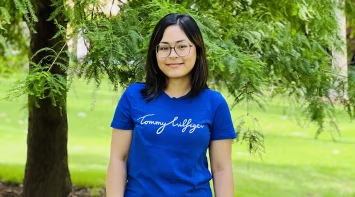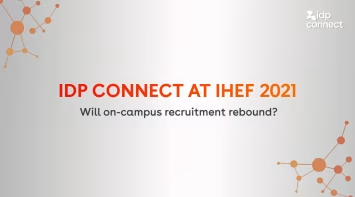Success stories are what keeps us moving ahead in our mission at IDP. With a commitment to transforming the industry for our students, clients and teams, our vision remains clear: to realise global opportunities for individuals worldwide.
IDP student, Ratih Arruum Listiyandini from Indonesia is one of these success stories. Through her local IDP office in Jakarta, Ratih successfully found an appropriate pathway to Australia, where she is currently undertaking a PhD program at The University of New South Wales (UNSW). Passionately involved in her local community, Ratih is an advocate for the mental health of Muslim students as her role as executive member of the Islamic Society UNSW and Indonesian Muslim Family Students. Ratih also recently launched HaiMama! a forward-thinking platform for online health education, for which she was awarded the 2022 UNSW New Wave Founders People's Choice award, and which helped her receive a nomination for the 2023 NSW International Student of the Year award.
As part of our new ‘Student Success Stories’ series, we spoke with Ratih on several topics - most notably, how her international education journey began, adapting to life in Australia, and why she ultimately selected UNSW as her institution of choice.
Tell us about how your journey began.
I am a clinical psychologist who completed my Bachelor's and Master's studies at the University of Indonesia. After spending some time pursuing a full-time clinical career, I decided to become an academic and lecturer because of my passion for knowledge, my enjoyment in sharing knowledge, and my strong desire to contribute to the advancement of psychological sciences through research. My journey towards further studies began with the desire to pursue a PhD as a means to support my career development as a lecturer in Indonesia. I also aimed to deepen and develop my interest in a research topic that I believe is highly needed in Indonesia.
In this regard, I have always wanted to experience PhD education abroad. I believed that living abroad would provide me with opportunities to expand my network and build a global reputation in my specialised field. Therefore, I started participating in programs that prepared me for further studies, including language preparation, proposal writing, and understanding life abroad. After a long period of preparation, I finally found a professor at UNSW who aligned with my research interests and who was willing to supervise me. That's when I began the application process to the university and subsequently handled the visa arrangements through IDP.
How did you first hear about IDP?
I first heard about IDP through overseas education fairs held in Indonesia, which I frequently attended to gather information about studying abroad. However, my decision to ultimately choose IDP as the education consultant was based on the recommendation of my close friend. They had previously gone through the application process to a university and visa application via IDP and found the experience to be convenient and comfortable. I even discovered that IDP's services to assist with university applications and visas were entirely free, especially if one begins the process early.
Was Australia always on your radar as a potential study destination? Were you considering any other places to undertake your research program?
I believe so. Australia is one of my top choices for pursuing my PhD studies for several reasons, including its geographical proximity and the emphasis on high-quality research. Apart from reaching out to professors in Australia, I did correspond with some professors in Europe. However, I ultimately chose Australia for several reasons. These included the availability of numerous scholarship options, professors who truly specialise in the research area I wish to pursue, and several personal reasons regarding family considerations, as well as language adaptation.
How did IDP counsellors in Jakarta help you choose the degree and institution most suited to your interests and needs?
When I contacted the IDP counsellor in Jakarta, I already had a clear idea regarding my first-choice university because I had corresponded with a professor who had agreed to be my supervisor. The IDP counsellor directed me to prepare the necessary documents supporting my university application. They meticulously reviewed each required document, provided feedback if anything was missing, and assisted me in submitting the application to the university to obtain the Letter of Offer. Additionally, they helped me follow up with the university's admissions department to ensure that my application was being processed and that results would soon be released. The counsellor patiently addressed my questions and confusion. This also included assistance with visa procedures; they guided me with the required documents, helped with visa applications for both myself and my dependents, and eventually, my visa was granted within a reasonably short period. I am very grateful for the excellent service provided.
Australia and Indonesia are next door neighbours, but quite culturally different. What was the first big “culture shock” moment you had after arriving in Australia?
I first came to Australia in 2016 through the Australia Indonesia Muslim Exchange Program funded by the Australian Government. This program helped me to understand multiculturalism in Australia, and where many immigrants reside. It allowed me to familiarise myself with some Australian customs, including the use of local English slang. I also learned that bidets aren't commonly found in toilets in Australia. This information helped me to be less shocked when I arrived here.
One thing that left a strong impression on me here is the emphasis on work-life balance in Australian culture. I observed that on average, shops, even in malls, close around 5 pm. Additionally, workers across different job levels are paid with relatively higher standards compared to wages in Indonesia. The high cost of living and wages in Australia has required me, as a scholarship recipient, to be more financially savvy and independent, as I cannot rely on household help as I did in Indonesia.
Furthermore, unlike Indonesians who tend to be more communal, Australians are generally more individualistic and less involved in others' lives unless asked for help. This includes visiting someone's home, where making an appointment, even far in advance, is necessary because dropping by unannounced is considered impolite.

What were some of the key ways UNSW and IDP counsellors helped you to settle in to your new destination?
IDP and UNSW helped me to understand crucial aspects related to the Australian education system, guided me in finding accommodation, and connected me with fellow student communities before my departure to Australia. As such, I felt adequately prepared before arriving. The orientation and welcoming activities conducted on campus also helped to understand the steps I needed to take to navigate my PhD studies at UNSW.
Tell us about your weekends – what do you like to do during your downtime?
During the weekends, I often spend time with my family, children, and husband. Sometimes we go for walks together to recreational areas, beaches, parks, and other places to enjoy our time together. Grocery shopping is also typically done on the weekends. During my leisure time, I prefer to rest, engage in hobbies, or communicate with my closest friends and family members back in Indonesia.
You are a staunch advocate for the mental health of Sydney’s Muslim student communities, as well as a member of the Islamic Society UNSW. How did you get involved with these local, Sydney-based communities?
Since my arrival, I was introduced by my friend to this community and eventually I became actively involved as a committee member. Through my role in the community, I have been engaged in organizing various events, including initiating discussions and sharing sessions about mental health issues. Many friends have also come forward to share more about the challenges they face, and I am happy to lend an ear and help them by listening and providing support.
What are some goals you would like to pursue after completing your research?
I aspire to advance my career in the field of mental health research, particularly focusing on developing innovative mental health interventions using the internet or digital technology. My goal is to create mental health services that can reach and assist broader communities, especially in developing countries.
What’s been the best part of undertaking your education in Australia?
The best part of the education I've pursued is the opportunity for myself and my family to gain new experiences, forge new friendships, and develop numerous life skills. This has been possible due to the conducive academic and non-academic environment that has supported my personal growth and development.
What’s some advice you would give to other prospective international students who aren’t sure how or where to start their overseas study journeys?
Explore more about your interests and strengths, then consult and seek an appropriate educational counsellor, such as those provided by IDP. Be diligent in gathering information about what you need when preparing for further studies abroad, and prepare yourself mentally and financially. When confident, lay out a step-by-step plan that can be followed to achieve your ultimate goal of pursuing studies abroad.
For more information on how to build your institution's brand awareness in Indonesia, contact IDP's Indonesia Destination Manager, Elsa Amiyanti: elsa.amiyanti@idp.com
You might like...

How This UTS Graduate Went from Student to Student Representative
We chat with Manisha Shrestha as part of our Student Success Stories
How IDP Helped Sarbjeet Singh Embark on his Award-Winning Student Journey
Victorian International Student of the Year, Sarbjeet Singh discusses his journey from Chandigarh to Geelong

Connecting Prospective Students with Experienced Students: Why Peer-to-Peer Engagement is Valuable and Effective
Powerful influencers, advocates for your brand – student ambassadors are key for recruitment.



